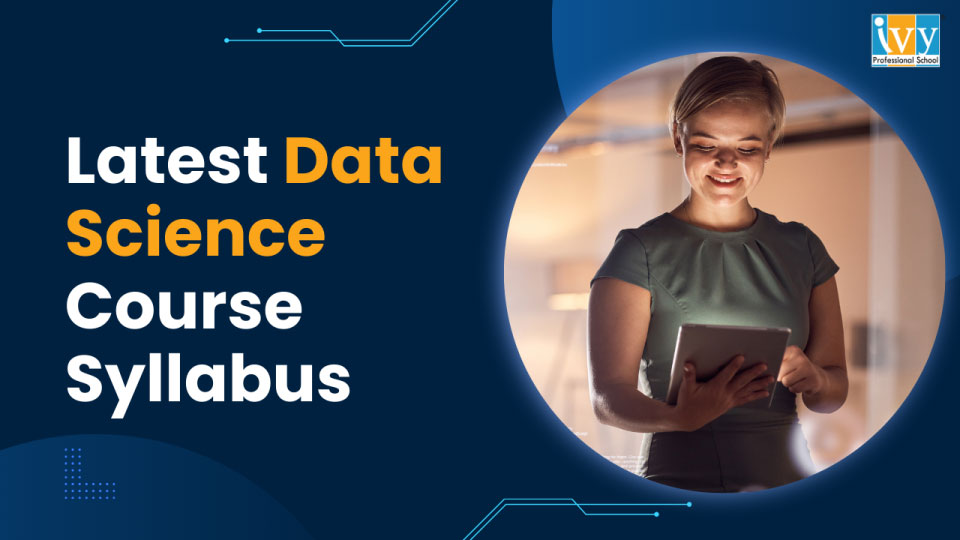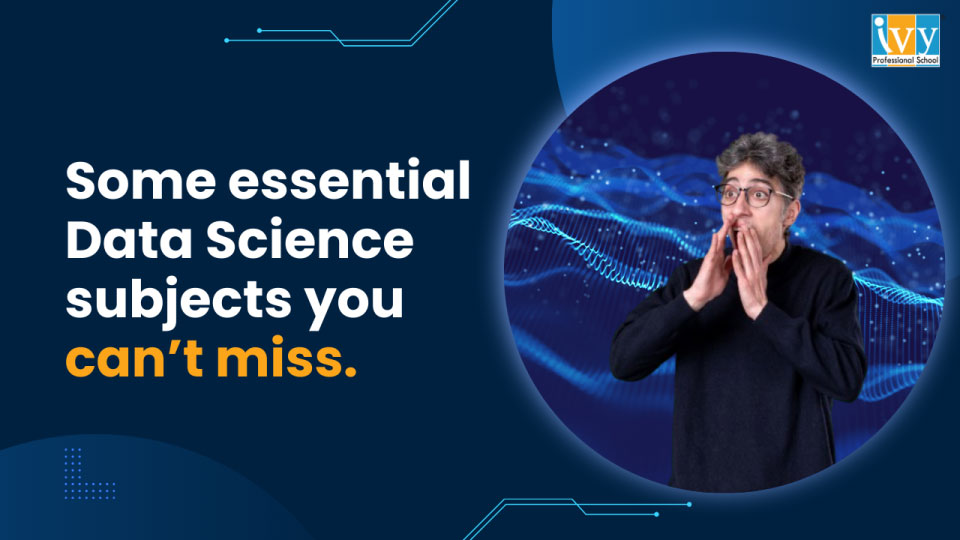Team Apr 23, 2024 No Comments

Data science is a very attractive career choice now. It offers excellent salaries, incredible work satisfaction, good job security, and a chance to make this world a better place.
No wonder the Bureau of Labor Statistics projects 35.2% employment growth for data scientists between 2022 and 2032.
If you want to enter this thriving field, the beginning steps can be confusing. What should you learn? What’s the syllabus of data science courses? What subjects do you need to master? All these are common questions you may have.
This blog post is here to help. We will share an updated data science course syllabus and subjects, giving you a roadmap to success. But first, let’s understand the role of data scientists and why they matter so much.
Data scientists basically find hidden patterns and insights in raw data. This helps businesses avoid guesswork and make informed decisions.
A McKinsey study found that data-driven companies are 23 times more likely to acquire customers, 6 times as likely to retain them, and 19 times as likely to be profitable. This shows why businesses are dying to hire good data scientists.
Data scientists also help businesses understand why a certain thing happened and predict what might happen in the future.
For instance, if a business finds its sales are dropping, a data scientist can help understand the cause behind it. To do this, they collect relevant data like sales numbers, website visits, customer surveys, etc. Then, they clean the data to make it organized.
Next, they use data analytics tools to analyze the data and find insights. They also use Machine Learning to examine massive data sets automatically, without any human involvement.
Finally, they communicate their findings to the business’s decision-makers. The insights help companies make better decisions about where to invest their money, what upgrades to launch, how to improve customer service, etc.
Now that you know what data scientists actually do, let’s see what data science subjects you have to study to become one.

Before we get into the syllabus of data science, let’s discuss some essential subjects you must study to become a skilled data scientist:
Databases and Big Data: In data science, you deal with massive amounts of data sets. So, you should know how to manage and process those large datasets. So here you learn databases (using SQL) and big data technologies like Hadoop and Spark.
Data Wrangling and Exploration: Real-world data is unorganized. Data wrangling helps you learn the process of cleaning and organizing data into a usable format. At the same time, data exploration involves studying the data and looking for initial patterns and relationships that might point toward deeper insights.
Data Analysis: Here, you learn how to carefully examine data to find meaningful information to support better decision-making. This is important because raw data is meaningless. Data analytics helps in extracting meaning from it and supports businesses, innovations, scientific research, etc.
Data Visualization: Numbers are boring and difficult to understand. That’s why here you learn how to use charts, graphs, and other visual tools to clearly communicate what you find in data analysis. It helps you tell stories and make complex information easier to understand.
Mathematics: This is the foundational subject in the entire data science syllabus. You will need a strong understanding of statistics, probability, linear algebra, calculus, etc. Statistics provides the tools to understand, analyze, and interpret data correctly. Linear algebra and calculus are important for developing and understanding the algorithms and models used in the field.
Programming: Data scientists use programming languages to implement everything they do. Python and R are the most popular languages you have to learn. This will help you write code to collect data, clean it, perform analyses, visualize data, build machine learning models, etc.
Machine Learning: This is an interesting thing to study. Here, you learn how to train computers to learn from data without being manually programmed. Machine learning includes various algorithms and methods that allow computers to find patterns, make predictions, and even take actions based on the data they are given.
Deep Learning: This is a subset of machine learning. Here, you learn about artificial neural networks that help in finding complex patterns from massive datasets. Deep learning has amazing applications, like computer vision, that enable image recognition for self-driving cars. It’s also found in AI chatbots and language models like ChatGPT.
Generative AI: Gen AI is the revolutionary AI model that can generate text, images, code, audio, and other types of data. It helps humans be more creative and automate repetitive processes. Here, you will learn about Generative Adversarial Networks (GANs), their applications, and how to build them using programming languages like Python.
The following data science course syllabus has been updated to meet current industry requirements. It takes you from the basics of data science to advanced concepts, teaching you all the in-demand tools you will need to solve real-world business problems.
This same syllabus is taught in Ivy Pro School’s Data Science and AI course with IIT Guwahati. This 45-week course also involves concrete projects to help you gain hands-on experience. So here we go…
The above data science course syllabus is strictly followed by Ivy Pro School’s Data Science and AI certification course. The course helps you learn industry-relevant skills, build a solid portfolio, and become job-ready in just 45 weeks.
This course is made in partnership with E&ICT Academy IIT Guwahati, where you are directly taught by professors on the IIT Guwahati campus. Besides, the IIT brand on your certificate gives you credibility and helps you stand out in interviews.
The online classes with live doubt-clearing sessions help you complete 50+ projects using industry-standard tools like SQL, Python, Keras, Tensorflow, OpenCV, Power BI, and Tableau. This is how you build an impressive portfolio that demonstrates your skills to employers.
Visit this page to learn more about Ivy’s IIT-certified Data Science and AI Certification course.